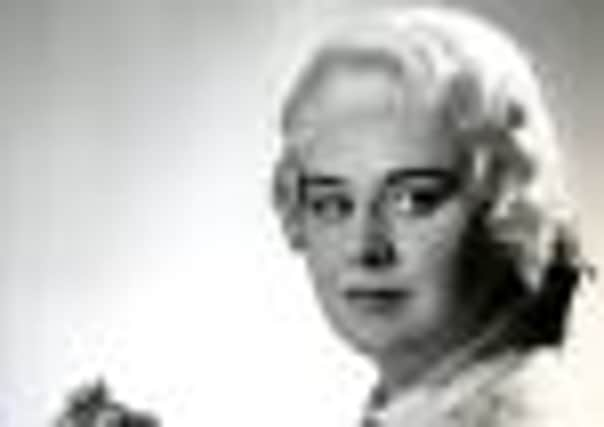Obituary: Sena Jurinac, soprano who won acclaim at Festival and across Europe


Sena Jurinac, one of the great opera stars in the postwar years, was a lyric soprano of much style and vocal elegance who was particularly renowned in Vienna for her interpretation of Mozart and Richard Strauss.
Her first appearance in the Vienna State Opera House was in 1945 when the city – and the opera house – was severely bomb-damaged. However, in the next few years Jurinac became a frequent visitor to Glyndebourne and that resulted in her making many historic appearances at early Edinburgh Festivals.
Advertisement
Hide AdAdvertisement
Hide AdHer vocal ease and grace enthralled audiences at the King’s Theatre and her warm personality made her, along with Kathleen Ferrier, one of the first stars of the Festival. Indeed it was from the acclaim Jurinac received with the Glyndebourne company in Sussex and Edinburgh that made the likes of Herbert von Karajan in Vienna cast her in leading roles. She was soon one of the most sought after sopranos in the world
She was born Srebrenka Jurinac (always, professionally and personally called Sena) and after studying locally she made her debut in Zagreb nine days before her 21st birthday, singing Mimi in La Bohème. In 1944, the conductor Karl Böhm offered her a place with the opera company in Vienna. While she was rehearsing, the opera house was severely bombed and Jurinac was nearly killed when a door was blasted off its hinges.
Unperturbed, she made her Vienna debut in 1945 as Cherubino in The Marriage of Figaro and came with the company two years later to London when she sang Dorabella in Cosi fan tutte. Such was her success she was immediately given a contract to sing the same role at Glyndebourne and Edinburgh in 1948.
Her association with Edinburgh was to become an endearing one. She loved the city and had no worries about working in the Scottish capital postwar. Indeed after the hardships she faced in Vienna, ration books and challenging back-stage conditions didn’t faze her.
Both Glyndebourne and the Festival were then run by Rudolf Bing so it meant that Jurinac came to five Festivals: firstly in 1949, when she sang Dorabella in Cosi fan tutte (“the production was near perfection”). The following year she made a strong impression as the Composer in Richard Strauss’ Ariadne auf Naxos: it was a role to which she brought a delightful vulnerability with a subtle touch of charisma.
Jurinac was in exceptional voice in 1953 when Glyndebourne visited with Mozart’s Idomeneo in which she sang the taxing role of Ilia. One critic wrote of that performance, “As Ilia, Jurinac is such a stylist that it would be difficult for any other singer to appear advantageously with her on the same stage in Mozart”.
In 1954, Jurinac demonstrated her vocal versatility when she sang a gloriously clear Fiordiligi, the soprano role in Cosi …, and the Composer in a reprise of Ariadne.
Robert Ponsonby, the former artistic director of the Festival, warmly recalled yesterday Jurinac’s performance as the Composer. “For me, the crowning glory of her early repertoire was her Composer: it was a poignant portrait. Her portrayal was infinitely touching, her voice and body and eyes all used with heart-stopping beauty.”
Advertisement
Hide AdAdvertisement
Hide AdThe final year she was in Edinburgh was 1955 when Glyndebourne brought something of an operatic rarity Verdi’s La Forza del Destino. It was her first essay at Verdi and she produced a stunning interpretation of the difficult soprano role.
Jurinac became a familiar figure around the capital and enjoyed being interviewed for the radio. She had a heavy accent but her face lit up and her eyes glowed with delight whenever people spoke to her. She was very much not a diva and her natural charm is fondly remembered.
No more so than when Jurinac and the Scottish-born baritone Ian Wallace, who was also with the Glyndebourne company, decided to visit three hospitals in the city one morning. It is a tradition they started in 1954 and has been continued intermittently ever since.
Wallace’s father had been MP for Kirkcaldy and he had spent two years in hospital suffering from spinal tuberculosis. They did not sing much opera during the hospital visits but Wallace accompanied Jurinac on his ukulele and, according to legion, she sang The Skye Boat Song while he plucked away. The two then returned to the King’s to perform Mozart.
One of the reasons she did not return to Edinburgh after 1955 was that Jurinac was cast both in Vienna and Salzburg by von Karajan. He persuaded her to extend her range to include more dramatic roles such as Verdi’s Desdemona (Otello) and Elisabetta (Don Carlos) and Puccini’s Madama Butterfly. She became a regular at Covent Garden from the mid-Fifties singing Butterfly under Rudolf Kempe and she had a triumph as the Marschallin in Visconti’s striking production of Der Rosenkavalier conducted by Georg Solti.
At the Royal Opera, Jurinac left an indelible memory when she sang Leonora in Beethoven’s Fidelio in the 1961 production. The opera was directed and conducted by Otto Klemperer
Her recordings were somewhat limited – Jurinac always preferred to sing in a live performances. She recorded Rosenkavalier twice (with Erich Kleiber and Solti), Fidelio twice (with von Karajan and Hans Knappertsbusch) and Don Giovanni twice (with Bruno Walter and Solti). Her recording of Strauss’ Four Last Songs – which she sang often at the Proms – was well received.
Jurinac is survived by her second husband, Josef Lederle, whom she married in 1965.
Alasdair Steven